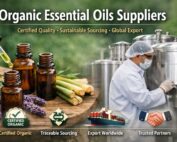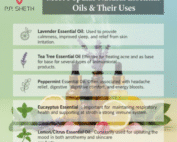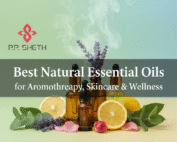Essential oils for aging skin are becoming an increasingly popular natural remedy to tackle fine lines, wrinkles, and dullness. As we age, the outer layer of our skin (epidermis) begins to thin, even though the number of cell layers stays the same. Pigment-producing cells (melanocytes) reduce in number, while the remaining ones grow larger—making skin appear thinner, paler, and more translucent. In simple terms, aging leads to visible signs like fine lines and wrinkles, which can be hard to manage. While creams and moisturizers promise results, many are now turning to essential oils as a more natural, holistic solution to support youthful, glowing skin.
Which Essential Oil Is Best for Ageing?
Essential oil aids in anti-aging by focusing on the appearance, restoring skin suppleness, and keeping it moist. We looked at a few essential oils that are anti-aging, including frankincense, lavender, rose, neroli, geranium, sandalwood, citrus, carrot seed, ylang-ylang, and rosemary.
Frankincense oil:
The study claims that the terpenoids in frankincense essential oil, such as limonene and alpha-pinene, have anti-inflammatory and antioxidant qualities. They help in preventing the body from making inflammatory molecules called pro-inflammatory cytokines. Reducing inflammation can slow down the aging process.
Furthermore, the antioxidant qualities of frankincense essential oil can help prevent skin damage caused by free radicals. Frankincense essential oil contains limonene, which helps to improve skin texture and protects against oxidative stress.
Rose Essential Oil:
Rose essential oil is a fragrant oil derived from rose flower petals. Rose essential oil contains numerous phytochemicals, such as geraniol, nerol, citronellol, linalool, and eugenol.
According to a published study, geraniol may help reduce photoaging, or aging caused by exposure to UV light from the sun. Nerol inhibits the generation of pro-inflammatory cytokines in skin cells, which can lead to skin aging and other skin disorders. Citronellol has strong antioxidant properties, which may protect skin cells from free radical damage and thereby postpone the onset of premature aging. Eugenol’s potent antioxidant qualities can help prevent premature skin aging and maintain a young appearance.
Carrot seed Oil
Carrot seed oil is high in antioxidants, vitamins, and minerals, making it an excellent ingredient for skincare products. Inflammation is a major cause of skin aging, and carrot seed oil has been shown to have anti-inflammatory qualities. This may help to minimize inflammation in the skin and prevent wrinkles and other indications of aging. Carrot seed oil’s moisturizing properties help to hydrate the skin, reducing the appearance of fine lines and wrinkles.
Carrot seed oil has been found to stimulate cell growth and repair, which may help to promote the production of new collagen and elastin in the skin. This may help to improve skin texture and firmness.
What Essential Oil Has the Most Collagen?
Collagen is responsible for skin suppleness, stretchiness, and healthy, flexible joints. As we age, collagen naturally breaks down, and the body struggles to produce more. The following are some of the essential oils that help create collagen.
Lavender Oil
Lavender is a blooming plant belonging to the mint family’s Lavandula genus. The plant produces spikes of violet-blue flowers with a unique aroma, as well as slender grayish-green foliage. Lavender essential oil is produced by steam distilling lavender blooms, and it is used in aromatherapy, fragrances, and personal care products.
Lavender oil offers anti-aging benefits for the skin because it includes phytochemicals with antioxidant, anti-inflammatory, antibacterial, and collagen-stimulating agents, such as linalool and linalyl acetate. Linalool can help protect against oxidative stress, which is a substantial contributor to skin deterioration. Linalyl acetate can improve skin suppleness and prevent the creation of fine lines and wrinkles.
Neroli Oil
Neroli oil is an essential oil derived from the flowers of Citrus aurantium L. It is frequently referred to as orange blossom oil because it is produced from the bitter orange tree. Neroli’s high vitamin C content promotes collagen formation, which aids in skin cell regeneration and tightening. It also fights premature aging by minimizing dark patches caused by sun exposure. Vitamin C stimulates skin cell renewal by promoting collagen protein synthesis for skin healing.
Furthermore, this vitamin is thought to minimize wrinkles, dark circles, and age-related indications, as well as ultraviolet rays from sunshine, which cause hyperpigmentation.
Rosemary Oil
Rosemary oil is a refined extract from Rosmarinus officinalis. It is a little evergreen plant that belongs to the mint family. According to the study, rosemary has anti-aging benefits due to its high antioxidant content. Rosemary essential oil contains antioxidants like carnosol, carnosic acid, ursolic acid, rosmarinic acid, and caffeic acid.
Due to its antioxidant qualities, rosemary can effectively reduce free radical damage and the radical damage that degrades the suppleness of the skin, hence avoiding the production of wrinkles. Additionally, its antifungal and antibacterial qualities might provide our skin with new renewal. The skin looks more youthful and revitalized since it deeply cleanses the skin’s complexion and promotes healing.
Which Essential Oil Reduces Wrinkles?
As we age, we all develop wrinkles. They are a typical aspect of growing older. Wrinkles appear on the regions of the body that receive the greatest sun exposure, such as the face, neck, backs of hands, and tops of forearms. There are two types of wrinkles: deeper furrows and fine surface lines. These essential oils can help you if you’re embarrassed by your wrinkles or if you want to avoid them altogether.
Lemon Oil
Lemon is well known for its high vitamin C content and its immune-boosting properties. However, lemon oils are utilized in a range of commercial skin care products to help minimize age indications such as wrinkles.
According to studies, lemon oil can help minimize oxidative damage. Lemon oil may also help reduce sun damage, which causes wrinkles.
Sandalwood Oil
Early research suggests that sandalwood may have anti-inflammatory qualities. In addition to these benefits, sandalwood may aid in restoring moisture to the skin. When the skin is properly hydrated, it may look plumper and reduce the appearance of fine lines and wrinkles.
Clary Sage Oil
Clary sage is a fragrant plant that is similar to the kind of sage that many people keep on their spice shelf. It has been demonstrated that Clary Sage possesses antioxidant properties. According to one study, Clary Sage may help shield proteins and DNA from free radical damage. Chemicals known as free radicals are thought to harm the skin.
Essential Oils for Glowing Skin
With an essential oil in hand, why need pricey facials or beauty salon treatments? Not only are essential oils fragrant, but they also have mystical properties. It is possible to brighten your face and eliminate black spots, pimples, acne, and other skin conditions with these little, tiny dark bottles.
Tea tree Oil
For those with oily skin and acne, this is their first pick. It is well known for having antifungal, antibacterial, and anti-inflammatory qualities. It improves the overall look of your face by controlling sebum production, eliminating bacteria that cause acne, and calming skin.
Lavender Oil
For flawless, radiant skin, lavender essential oil is the most widely used essential oil. It fights free radicals, reduces acne, balances the complexion, and slows the onset of fine wrinkles. It is frequently used in cosmetics, face toner, face serum, and anti-aging creams.
Sweet orange essential oil
In addition to being a source of vitamin C, it contains potassium, beta-carotene, magnesium, and fiber, all of which stimulate and restore collagen synthesis. It helps in fighting acne and detoxifying the skin, leaving it refreshed and luminous.
Essential oils can be used in your anti-aging skincare routine, but you should consult your dermatologist first. While most essential oils are harmless, they should always be blended with a carrier oil and tested on a tiny patch of skin before being applied to larger portions of the body. Many of the oils listed above are available as essential oils. One at a time, incorporate them into your routine. This can help you prevent responses to prescription or over-the-counter medications you may already be using.
Most Recent Posts








